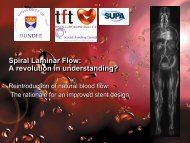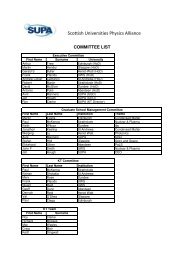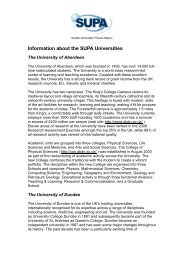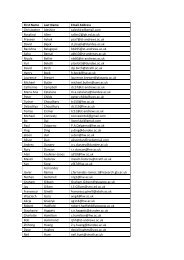Catalogue of Courses & Student Handbook - SUPA
Catalogue of Courses & Student Handbook - SUPA
Catalogue of Courses & Student Handbook - SUPA
You also want an ePaper? Increase the reach of your titles
YUMPU automatically turns print PDFs into web optimized ePapers that Google loves.
Energy<br />
Semester 2<br />
Energy is a new theme, on a very important, and yet diverse topic.<br />
Our courses relate to two major aspects <strong>of</strong> the theme’s activities:<br />
solar and nuclear power. They are designed to be accessible to all<br />
Energy Theme students – so that nuclear students could take the<br />
solar power course and vice versa. In addition to these courses,<br />
students are encouraged to select courses relevant to their interests<br />
and projects from other themes (particularly Condensed Matter and<br />
Materials Physics, Photonics and Nuclear and Plasma Physics).<br />
Semester 1<br />
Solar Power (<strong>SUPA</strong>SPR)<br />
Lecturer: Ifor Samuel et al<br />
Institution: St Andrews<br />
Hours Equivalent Credit: 14<br />
Assessment: Problem Sheets and reports on laboratory experiments.<br />
This is a two day residential course running in St Andrews. <strong>Student</strong>s<br />
who are interested in this course are asked to register for the course<br />
and indicate their accommodation needs by Monday October 1st<br />
Course Description<br />
This course will provide an introduction to solar photovoltaics (PV).<br />
Lectures will introduce the problem <strong>of</strong> energy supply, and the amount<br />
<strong>of</strong> solar power potentially available. The general principles <strong>of</strong> PV will<br />
be covered, followed by lectures on a range <strong>of</strong> current and future PV<br />
technologies: crystalline, polycrystalline and amorphous silicon, thin film<br />
inorganic semiconductors, and organic semiconductor PV. Three lab<br />
sessions will enable students to explore key ideas in the lectures.<br />
This is an intensive two-day course, using a range <strong>of</strong> invited lecturers<br />
from <strong>SUPA</strong> institutions.<br />
Laser Driven Plasma Acceleration (<strong>SUPA</strong>LDP)<br />
Lecturer: Dino Jaroszynski & Paul McKenna<br />
Institution: Strathclyde<br />
Hours Equivalent Credit: 16<br />
Assessment: Continuous Assessment<br />
This is a final year undergraduate course organised by the University<br />
<strong>of</strong> Strathclyde. This course is cross-listed with the Nuclear and Plasma<br />
Physics Theme.<br />
Course Description<br />
This course will address the topical research in laser plasma interactions,<br />
laser-plasma acceleration and plasma based radiation sources.<br />
It will be divided into four connected parts starting with a thorough<br />
but brief introduction to the main theoretical concepts <strong>of</strong> laser-plasma<br />
interactions. The second and third parts will address the interaction <strong>of</strong><br />
intense laser pulses with under-dense and over-dense plasma,<br />
respectively, with particular emphasis on laser-plasma acceleration,<br />
absorption, propagation, electron transport, plasma waves, shock<br />
waves, radiation mechanisms, non-linear optics <strong>of</strong> plasma etc. The fourth<br />
part will introduce students to the main concepts <strong>of</strong> free-electron lasers,<br />
which are important tools for scientists investigating the structure <strong>of</strong><br />
matter. <strong>Student</strong>s will proceed quickly from basic concepts to advanced<br />
and current applications such as compact radiation and particle sources,<br />
inertial fusion energy, fast ignition etc. They will gain a good introduction<br />
to laser-plasma interactions, which will provide a good basis for<br />
postgraduate research in this area.<br />
The Nuclear Fuel Cycle (<strong>SUPA</strong>NFL)<br />
Lecturer: David Hamilton<br />
Institution: Glasgow<br />
Hours Equivalent Credit: 6<br />
Assessment: Continuous Assessment<br />
This course is cross-listed with the Nuclear and Plasma Physics Theme<br />
Course Description<br />
With policymakers around the world considering a nuclear renaissance<br />
as one <strong>of</strong> the possible solutions to society’s low-carbon energy needs in<br />
the medium-term, this course will provide an introduction to the nuclear<br />
fuel cycle. Covering the technical aspects <strong>of</strong> nuclear power production<br />
at an introductory level, the course will cover radiation interactions,<br />
reactor and fuel cycle technology and core physics. In addition, as any<br />
discussion <strong>of</strong> the nuclear fuel cycle is incomplete without some<br />
consideration <strong>of</strong> the economic, industrial and policy dimensions, the<br />
course will cover some <strong>of</strong> the most important non-technical aspects<br />
associated with nuclear energy. The course is intended for students<br />
with an interest in nuclear technology, whether as a possible future<br />
career path or simply for general interest. Specialist knowledge in<br />
nuclear or particle physics is not required for this course.<br />
Energy<br />
17







